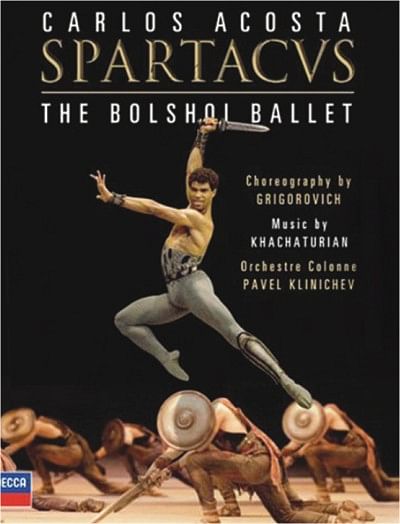Only superlatives would do

Exquisite, lyrical, captivating. None of these superlatives would be out of place, after seeing the film “Spartacus”, performed by the famous Russian Bolshoi Ballet.
The film begins with the megalomaniac Roman general Crassus celebrating his victory in Thrace from where he has brought many captives, including the eponymous hero and his wife Phrygia. The film captures the deep pain of the shackled Spartacus and his thwarted attempt to free his men. The villainous conspirators who stop him in his endeavour are Crassus and his seductive mistress Aegina. Spartacus is wounded and killed by the spears of the Romans. He leaves behind a grieving Phrygia.
The ballet is known for its tender loves scenes between Spartacus and Phrygia, particularly to the familiar “Adiago of Spartacus and Phrygia ” as the lovers celebrate their escape. It also strikes a chord with Crassus, Aegina and Crassus' men indulging in a dissolute sexual orgy. Another memorable act has the courageous Spartacus engaged in a single combat with Crassus, defeating him but allowing him to flee. Of course the audience cannot remain unmoved as the body of the impaled folk hero Spartacus is carried off by his closest followers while an inconsolable Phrygia mourns her husband's death.
The credit for screening the film goes to music connoisseur Dr. RP Jain, a retired professor of German at the renowned Jawaharlal Nehru University , New Delhi. For the last four years Jain has introduced and curated similar films on ballets, operas and concerts. His introduction to “Spartacus” was truly fascinating and gave new glimpses of the famous ballet production.
As Jain pointed out in his introduction, “Yuri Grigorovich's vibrant choreography gave full expression to the virility and strength for which Russia 's male dancers are renowned. It is no exaggeration to say that Spartacus is a celebration of male dancing at its most spectacular.
'Spartacus', the story of a Roman slave's fight for freedom has inspired many ancient writers, who see Spartacus as a folk hero struggling against the oppression of a slave-owning aristocracy.”
Jain also had high words of praise for the “high-powered” music of the Armenian composer, Aram Khachaturian.
Jain truly deserved the congratulations that poured in at the end of the film, corroborating this correspondent's view that the film was indeed nonpareil. Perhaps the highest compliment came from a lady who said, “What one sees otherwise is mere child's play.”

 For all latest news, follow The Daily Star's Google News channel.
For all latest news, follow The Daily Star's Google News channel. 



Comments